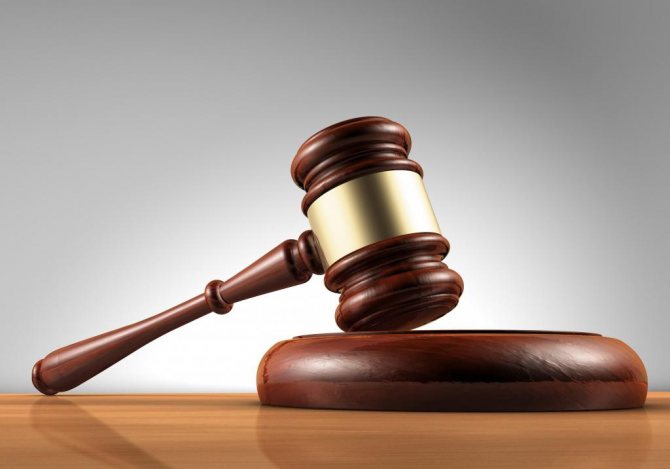Consulting lawyer › Complaints
Send
- Procedure and deadline for filing a private complaint against a court ruling
- Rules for filing a private complaint
The Russian judicial system is characterized by the presence of several levels, therefore, participants in the trial who are not satisfied with the decision in the case have the right to appeal the ruling and refute the charges - a private complaint is filed. A private complaint is drawn up and filed in accordance with the procedure established by the Code of Civil Procedure. Participants in the process, as well as third parties whose interests or rights are infringed by a court ruling, can submit a document. It is important to competently and reasonably draw up a sample private complaint.
It will be extremely problematic for people who do not have a legal education to draw up a document on their own. Only an experienced specialist knows all the features of the legislation and will be able to professionally get around the “sharp corners” of the current system and refute the accusations. If a private complaint is drawn up in an arbitration process under the supervision of an expert, the success of the case is guaranteed. It is worth noting that the court will not consider illiterate and unfounded statements, and the claim will be returned to the sender.
A prosecutor or representatives of the parties can also file a complaint against a court ruling in arbitration proceedings. A lawyer in this area of law will help you create an effective algorithm of actions when appealing a decision of a court of general jurisdiction. Today, Russians can evaluate the work of legal experts on the Internet. Remote recommendations are completely free and available to everyone.
In what cases is a private appeal filed against a ruling of the court of first instance?
The list of these cases is presented in Part 1 of Art. 331 of the Civil Procedure Code of the Russian Federation.
According to this list, a private complaint is filed if this is expressly provided for by the Code of Civil Procedure of the Russian Federation or the ruling of the court of first instance excludes the possibility of further progress of the case (for example, appealing court rulings on securing a claim, refusing to accept a statement of claim, returning a statement of claim, leaving a statement of claim without progress , on the direction of the case according to jurisdiction, etc.
Other court rulings can be appealed only simultaneously with the appeal of the decision in the case (for example, court rulings on the refusal of requests to commission a forensic examination, on the inclusion of case materials and the examination of evidence). That is, it would be more correct to say that in these cases a separate complaint is not filed, and objections to these determinations can be included in the appeal against the court decision.
In accordance with the rules established by Part 2 of Article 331 of the Code of Civil Procedure of the Russian Federation, a private complaint is filed:
- for a ruling by a magistrate in the district court
- for rulings of a district court (garrison military court) - to the Supreme Court of the republic, to a regional or regional court, a court of a federal city, a court of an autonomous region, an autonomous district or a district (naval) military court;
- on rulings of the supreme court of a republic, a regional, regional court, a court of a federal city, a court of an autonomous region, a court of an autonomous district, a district (naval) military court - by the appellate instance of the supreme court of a republic, a regional, regional court, a court of a federal city, a court of an autonomous region , autonomous district court, district (naval) military court;
- for a ruling by the Supreme Court of the Russian Federation to the Appeals Board of the Supreme Court of the Russian Federation.
It must be borne in mind that a private complaint is filed through the court of first instance, which issued the appealed ruling.
Grounds for filing an objection
Litigation is a confrontation between two parties - the plaintiff and the defendant. At the same time, each side strives to prove that it is right.
This leads to the fact that procedural actions performed by one party raise objections from the other party. Thus, filing objections is one of the ways to counteract.
The current legislation of the Russian Federation does not regulate the procedure for filing objections. This allows you to file written and oral objections to any actions taken by the opposing party to the proceeding.
To file an objection to a private complaint, the following conditions are required:
- One of the parties to the litigation filed a private complaint;
- The filed private complaint was accepted by the court for consideration.
The objection must be stated in writing and submitted to the court that made the decision being appealed. Submitted objections are attached to the case materials and are considered by the appellate authority together with the private complaint.
Watch the video. How to behave in court:
Registration procedure
As a general rule, a private complaint can be filed within 15 days from the date of the ruling by the court of first instance, unless other deadlines are established by this Code.
The date of filing a private complaint will be considered the day it is transferred to the court office or the complaint is sent by mail.
The procedure for considering a private complaint is established by Art. 333 Code of Civil Procedure of the Russian Federation.
According to this article, after receiving a private complaint, the court of first instance is obliged to send copies of the private complaint and documents attached to them to the persons participating in the case, and also set a reasonable time limit for the said persons to present their objections to the private complaint.
https://www.youtube.com/watch?v=ytaboutru
As a rule, a private complaint against a ruling of the court of first instance is considered in the absence of the parties to the case.
We invite you to familiarize yourself with: Appeal against a court decision: sample, example, form || Appendix to the appeal of the Civil Procedure Code of the Russian Federation
As an exception, private complaints against the following definitions are considered without notifying the persons participating in the case:
- on suspension of proceedings in the case;
- on termination of proceedings;
- about leaving the application without consideration;
- on the satisfaction or refusal to satisfy an application for review of court decisions based on newly discovered or new circumstances,
- on forced execution or refusal to enforce a decision of a foreign court;
- on recognition or refusal to recognize a decision of a foreign court;
- on recognition and execution or refusal to recognize and enforce decisions of foreign arbitration courts (arbitrations);
- on the cancellation of the arbitration court decision or refusal to cancel the arbitration court decision;
- on the issuance of a writ of execution for the forced execution of an arbitration court decision or on the refusal to issue a writ of execution for the forced execution of an arbitration court decision.
Persons participating in the case are notified in advance of the time and place of its consideration.
At the same time, in these cases, taking into account the nature and complexity of the procedural issue being resolved, as well as the arguments of the private complaint or objections to them, the appellate court may summon the persons participating in the case to the court hearing.
The law (Article 327.2 of the Code of Civil Procedure of the Russian Federation) establishes the following terms for consideration of a private complaint:
- district court, supreme court of the republic, regional, regional court, court of a federal city, court of an autonomous region, court of an autonomous district, district (naval) military court, a complaint within a period not exceeding two months from the date of its receipt by the court of appeal;
- Supreme Court of the Russian Federation - within a period not exceeding three months from the date of its receipt.
Having considered a private complaint against the ruling of the court of first instance, the appellate court has the right to either leave the appealed ruling unchanged and the complaint without satisfaction, or to cancel the court ruling in whole or in part and resolve the issue on the merits.
In one of the following publications I will present samples of some private complaints from my practice.

The court ruling can be appealed within 15 days from the date of its adoption. The applicant must count the deadline from the next day (after the issuance).
The period for appealing rulings is established in Article 332 of the Code of Civil Procedure of the Russian Federation and cannot be changed by the court. However, it does not depend on the date of receipt of a copy of the determination. The ruling is considered to have entered into legal force if a complaint is not received against it within the established 15-day period.
According to Article 107 of the Code of Civil Procedure of the Russian Federation, this period is counted only in working days, that is, weekends and holidays must be excluded from the appeal period.
If the court receives a private complaint against a court ruling, the ruling will enter into legal force only after its consideration.
More information about calculating deadlines: Procedural deadlines.
The missed period for appeal can be restored if there are good reasons for this. To do this, it is necessary to submit along with the complaint an application for the restoration of the procedural period.
A private complaint is filed with the court that issued the ruling. You can submit it in person or send it by mail. Be sure to attach copies of it to the complaint according to the number of participants in the civil case. There is no state fee for filing a private complaint.
We invite you to familiarize yourself with: Military mortgage - Federal Law 117 on the savings-mortgage system of housing for military personnel
A private complaint is considered at a court hearing of the second instance. The court hearing is held even if the participation of citizens is not provided. A protocol on the conduct of the court session is drawn up.
After considering a private complaint, the district court issues an appellate ruling. The court's ruling may remain unchanged, and the private complaint may not be satisfied. It is on this day that the appealed ruling comes into force. The court may overturn the ruling. Then the controversial issue is resolved by an appeal ruling, which comes into force immediately.
When filing a complaint, it should be taken into account that this does not entail the suspension or postponement of the consideration of the civil case. The court will separate the materials on the private complaint against the court ruling, and will continue to consider the case itself on the merits.
The period is 15 days. The time for filing begins to count from the moment the court makes its decision. The day of adoption of the act itself is not included in the deadline. Days are considered calendar days, not working days, and therefore all holidays and weekends are also included in the appeal period.
For example, if the determination was made on March 5, then the period for appeal will begin on March 6. The last day of the deadline is March 20.
The period for appealing a court decision, in turn, from the date of its adoption is one month.
If the deadline is missed, you should file a petition for its restoration. The petition can be included in the text of a private complaint or submitted as a separate document, the main thing is to do this simultaneously with filing the complaint.
A private complaint must be made in writing. The document must contain introductory, descriptive and concluding parts, the necessary details and signatures. The text must be written in an official business style, be clear, understandable, and not contain slang words or obscene language.
The following persons can appeal a court decision:
- The defense and prosecution sides. Representatives of both parties are required to provide the Charter of the legal entity and a power of attorney, which will confirm their right to carry out procedural actions;
- Third parties who are participants in the case, if this concerns their legal capacity;
- Persons who did not take part in the trial, but the court decision also affects their rights and obligations;
- Prosecutor;
- Bodies of state power and local self-government;
- Guardianship and trusteeship authorities.
Contents of the complaint
The most common reason why a judicial authority refuses to consider a complaint is errors in its preparation. The main points that must be present in the complaint:
- Name of the court to which the complaint will be sent.
- Information about the applicant.
- Link to the contested court ruling.
- Supporting documents prepared as an attachment to the application.
- Petition to cancel the determination.
- Signature and date of application.
New evidence can only be used if there are objective reasons why it was not included in the case before.
Sample document
It is necessary to indicate what exactly the applicant does not agree with, at the same time refer to the rules of procedural law and list his interests that are violated by the decision. Violations must be supported by evidence. You can attach acts, photographs and videos, and letters as evidence.
Then a template proposal is written, where the applicant writes his requirements. For example, cancel the decision completely or make a new one. At the end of the document, the attached materials are listed in the form of a list, signed and dated.
We invite you to read: Recourse claim in civil proceedings
The complaint and attached materials are provided to all participants in the process. The documents are sent not by the applicant himself, but by the appellate court.
As a general rule, appeals against decisions of the court of first instance are carried out without notifying the participants in the case. This means that the court will study the arguments of the application on its own; there will be no hearings on this issue.
However, the parties to the dispute will be invited to court if an issue of increased complexity is being considered, for example, if a lower court terminated the proceedings or refused to consider the case due to newly discovered circumstances.
The period for consideration of a private complaint against a court ruling depends on the level of the court in which the trial will take place. The time is counted from the day the case arrives at the higher court.
Consideration of the complaint in the district court and the court of the subject (territorial, regional, supreme court of the republic, etc.) will take two months. The consideration in the Supreme Court of the Russian Federation continues for three months.
Definitions against which a private complaint may be filed
By filing a private complaint, you can appeal against the court's decisions taken at first instance. Determinations of subsequent authorities cannot be appealed in this manner.
A private complaint may not be filed against all court decisions. But only those that interfere with the consideration of the case. The possibility of appealing certain types of determinations is specifically indicated in the Code of Civil Procedure of the Russian Federation.
Art. 333 Code of Civil Procedure of the Russian Federation. The procedure for filing and considering a private complaint, presentation of the prosecutor. Together with supporting documents, the complaint is addressed to a higher court (appeal instance). A complaint is filed through the court that accepted the disputed document.
| Who made the determination | To whom should the application be addressed? |
| World judge | District Court |
| District Court | Court of the subject (regional, regional, etc.) |
| Court of the subject (territorial, regional, etc.) | Appellate instance of the court of the subject (regional, regional, etc.) |
| Supreme Court of the Russian Federation | Appeal Board of the RF Armed Forces |
The completed package of documents must be sent to the court that issued the ruling, which will forward the complaint to the appellate court along with the case materials.
For example, if the magistrate made a contested ruling, then the complaint must be filed through the magistrate, but indicate the district court in the heading. Having received the documents, the magistrate will formulate a case and send it for consideration to a higher authority.
Will there be any benefit from objections?
When filing objections, you should remember that they do not apply to mandatory procedural documents. You can be sure that objections will be attached to the case materials, but you cannot be sure that the appellate authority will read them.
The benefit of objections lies elsewhere. The fact is that the appellate instance does not practice summoning all participants in the process to a court hearing to consider a private complaint, especially since the law does not oblige it to do this.
Thus, Article 333 of the Code of Civil Procedure provides that the appellate authority considers private complaints without the participation of the parties, but, given the complex nature of the case, it can (but is not obligated to) invite interested parties to the court hearing.
However, the appellant who appears will be given the floor. Accordingly, subject to the presence of objections, the appellate instance will give the floor to the opposing party. That is, the author of the objections will be able to personally convey his point of view.









